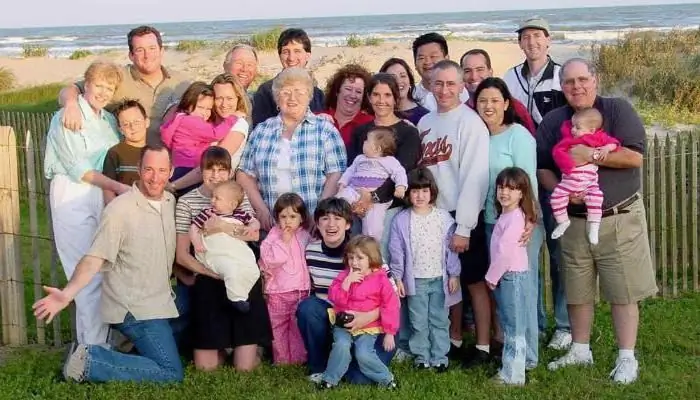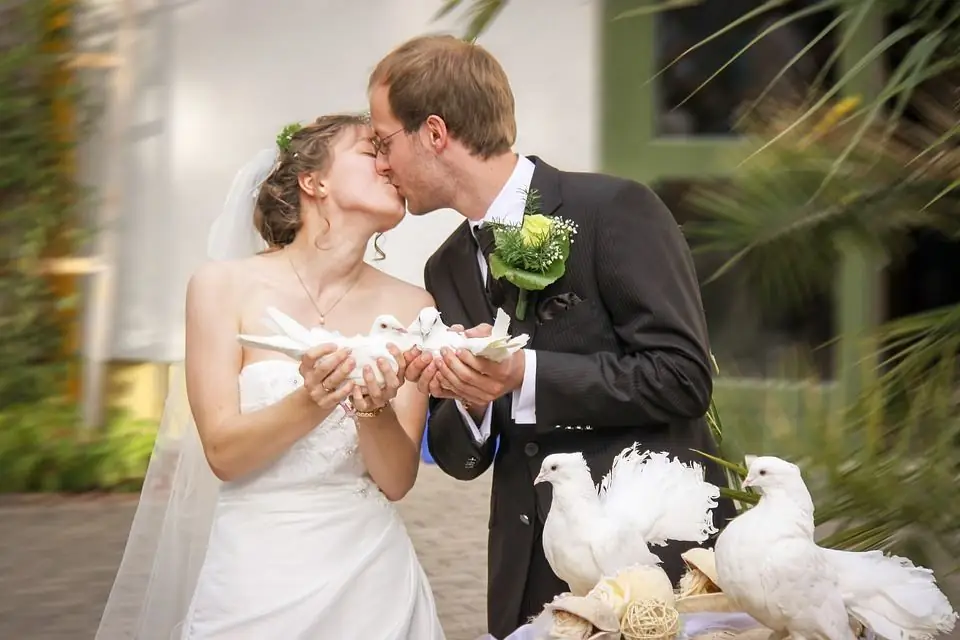2026 Author: Priscilla Miln | miln@babymagazinclub.com. Last modified: 2025-01-22 17:55:21
Time does not stand still, and with it human relations and society as a whole change. The patriarchal structure of the social cell is being replaced by the egalitarian family. "What is this?" the reader will ask. This is the topic of our conversation today. If we reveal all the cards at once, the intrigue will die. Therefore, there is no need to hurry.
Definition and features
An egalitarian family is a relationship in which neither spouse claims power, it is divided equally between a man and a woman. The same thing happens with social roles and domestic duties. There is no division into "male" and "female". Does the one who can.

Is it clear what an egalitarian family is? The signs that characterize her follow.
- Priority of individual interests over family (tribal). In practice, this means that each member of the family wants not only to fulfill their family, gender role, but also to achieve something in the professional field. Therefore, relationships should be built in such a way that the husband and wife have room forcreativity and realization.
- A family is created by the mutual desire of a man and a woman. Everyone's personal choice is decisive. It seems that no explanation is needed here. In theory, an egalitarian family is an entity that is created only because a man and a woman love each other. But, as we know, theory and practice do not always coincide.
- No more than two generations live under one roof (parents and children).
- The couple is planning children together.
- Small children. With all the ensuing consequences: the emphasis is on the "quality" of children, not "quantity". That is, the spouses set the goal of preparing children for social life as much as possible: raising them properly, giving the education that will help the offspring get a good, interesting and well-paid job. Since there are not many children (one or two), the man and woman do not forget about themselves and combine parental functions with other social roles. As an inevitable outcome: sex is perceived as a source of pleasure, not a means of reproduction.
- High degree of social and geographic mobility. Simply put, the saying “where you were born, there you came in handy” is not about members of an egalitarian family. People change jobs and places of residence if necessary. Not to say that this happens easily and freely, but no one makes a tragedy out of this either.
- Spouses are legally equal in possession and inheritance of marital property.
The egalitarian family is a revolutionary thing that allows both men and women to “breathe freely”. But without comparison with other types of family arrangementsrelationship cannot be fully appreciated.
Types of family. Patriarchy
What are the alternatives? There are also patriarchal and matriarchal families. We will talk about them very briefly in order to understand the difference.
Characteristic features of a patriarchal family:
- Priority of family interests over individual interests.
- The creation of a cell is dictated not by the personal choice and love of a man and a woman, but by the economic interests of relatives who are part of the “patriarchal family” formation.
- The family lives in a "big swarm body". Several generations and branches of a family can live under one roof.
- Large families. Moreover, it is also dictated by economic interests. More children, more workers.
- A woman cannot terminate a pregnancy even if she wants to. This is prohibited by the family code. There is no talk of any plan regarding the appearance of children. A woman "fruits" while she can.
- A change of residence or work in such a family is out of the question. Such an education is very clumsy in a social sense.
- Recognizes the primacy of tradition and customs, personal preferences and values are not considered.
- Property and other valuables are inherited exclusively through the male line.

Should I say that "democratic relations" is a concept not known to people who live according to the patriarchal canon?
Matriarchy
It is more difficult to talk about matriarchy as a social structure, because many are still sure that it is notIt was. Although Erich Fromm, referring to Bahoven, refutes this point of view. In other words, the debate is ongoing. The problem is that when people talk about ancient times, then history, archeology and mythology merge together, and it is not possible to separate one from the other. In any case, it was so long ago that it is difficult to talk about it in detail, we will indicate only those signs that are known for sure:
- A family is built around a woman, not a man.
- Inheritance of property and values is passed down through the maternal line.
- Pedigree is considered from the mother and female representatives of the genus.

Matriarchy is certainly the most interesting phenomenon, especially its “modern version”: when formally the relationship has the status of an “egalitarian family” (it’s clear what it is), but actually matriarchal, where a man is a subordinate element (the same is true and in relation to patriarchy, when the wife depends on her husband with formal equality of the parties).
Finishing the conversation about the types of families, let's say that there are enough supporters of both matriarchal and patriarchal families in the world. There are also countries where the models are functioning, it is difficult for a Westerner to judge their success.
Household interchangeability of spouses
After a cursory examination of family arrangements, it became clear why the egalitarian type of family is preferable for both certain men and some women. However, consider it from different angles.
Dignity:
- equality;
- understanding;
- freedom;
- mobility;
- dialogue as a way of family existence.

On paper, the model is so good that it's hard to find flaws in it. At this point, we must remember that traditions are strong in Russia, that is, not all the people around us support progressive ideas in general and the idea of a family in which each family member does not what his gender role requires him to do, but what he can do in particular. Therefore, if we note the shortcomings, let's say: the model can cause individual intolerance in some people, as well as bring up complexes if the couple practices "equal marriage" in a patriarchal environment.
Social equality of husband and wife
An egalitarian marriage implies not only the rights, but also the duties of both wife and husband. The fact that in this system of relations a man and a woman are interchangeable redistributes priorities. For example, money ceases to be a purely male problem. On the one hand, this is good, because the husband no longer feels lonely in this sense, he knows that if something happens to him, the wife will help not only morally, but also financially. On the other hand, this is bad because a woman and a man will no longer be able to appeal to the gender role and conscience of a person to use the epic phrase: “You are a man!” or "You're a woman!" Here, each member of the family is responsible for the other and for the common offspring.

Emotional richness
From the basic principles of such a marriage followsone characteristic feature of the egalitarian family, which is placed in the sub title. It is strange, perhaps, to single out emotions in a relationship in a separate group. But since the model offers a qualitatively different interaction, why not say that equality has a beneficial effect on the psychological climate in the family? Love flourishes if it grows on the soil of freedom. And repressions are needed only in order to fight objectionable ones, oppression cannot cause love. When one spouse does not respect, does not appreciate the other, and this goes on all his life, then resentments accumulate, and they, even unspoken, poison the family atmosphere.
Egalitarian marriage is seen in this sense as the exact opposite of both patriarchy and matriarchy. Do not think that this is some kind of ideal. Firstly, there are so few truly equal relations (why, we will discuss below), and secondly, the majority of egalitarian families in form represent modern patriarchy and matriarchy in content. For example, when both work, but in the order of things, when a man says: "This is a woman's business!" And the wife on occasion reminds: “Be a man!” We think the reader understands perfectly what we are talking about. Of course, it can be said that the egalitarian family, like any synthesis, contains the qualities of thesis and antithesis in a sublimated form, obeying the laws of Hegelian dialectics. But interpretation is a matter of taste.
Egalitarian marriage is a fragile entity
It turns out that an equal marriage is pure pleasure? Not certainly in that way. The primacy of personal interests over family interests is fraught with many problems. For example, you can remember the film and book "The World Through Garp's Eyes". When the spouses tried not to limit each other and even, if possible, forgive betrayal. Garp's wife somehow coped, but he himself did not. And do not think that a democratic marriage involves moral anarchy and sexual freedom. Rather, it is an illustration of what the misinterpretation of freedom and equality leads to. Such a family arrangement is suitable only for mature people who are ready to take responsibility. If family and marriage are a way to adjust to life, then an equal and repressive-free relationship is hardly the way to go.

And the last thing: freedom is great, but it needs a habit, and a person must also have a certain amount of reasonableness in order to know where rights end and duties begin. As Bernard Shaw said: "Freedom means responsibility, that's why most people are afraid of it." And without freedom, one cannot build equal and emotionally rich relationships. Modern life offers at least three models for building relationships. And these are only global possibilities, and how many practical variations there are between them! Therefore, everyone decides for himself.
Recommended:
The rights and obligations of spouses arise from the date of registration. Family Code and Legal Advice

On the day of the legal creation of a family, the newlyweds take on new obligations - not only of a personal nature, but also legal ones. The obligations acquired in the legal consolidation of the relationship must be known to the couple, since ignorance does not exempt from fulfillment. Given the many facets of family relationships and guided by the basic principles prescribed by law, it is possible to build a strong and happy family
Family as a social group and social institution. The role of the family and family problems in society

Family is the most important social institution. Many specialists are concerned about this topic, so they are diligently engaged in its research. Further in the article we will consider this definition in more detail, we will find out the functions and goals set by the state in front of the "cell of society". The classification and characteristics of the main types will also be given below. Consider also the basic elements of the family and the role of the social group in society
Which is better: a razor or an epilator? Reviews of women who have tried both methods of getting rid of unwanted hairs

Every woman wants to get rid of unwanted body hair. Today, there are many ways to make dreams come true. One of the most effective is to use the epilator regularly. Reviews about this device can be found very different, but what about in practice? Is it really a worthy alternative to a razor?
Spouses are a family that should be a fortress for children and for themselves

The institution of marriage must be protected and improved. Why do many people forget about this, destroying their family and the lives of loved ones?
In which position can you get pregnant quickly? Poses to get pregnant fast

It would seem that pregnancy is a simple and completely natural thing, and in order for your life to be filled with even greater happiness, you just need to love and perform a natural ritual conceived by nature. Of course, sometimes this is exactly what happens, but, unfortunately, not always. And here an important role is given to the position of the bodies and postures that are taken during love games

